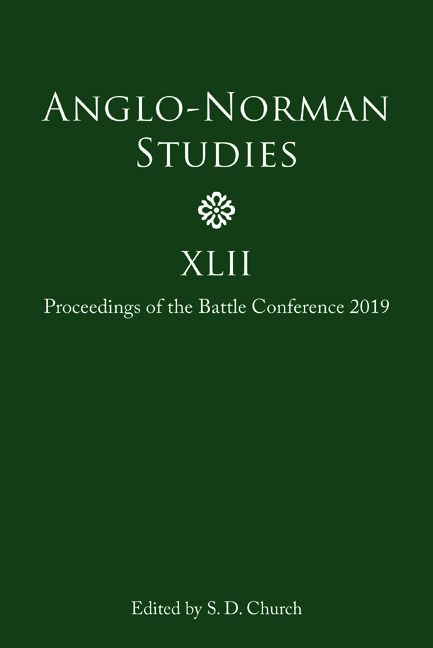Book contents
- Frontmatter
- Contents
- Illustrations and Tables
- Editor’s Preface
- Abbreviations
- Reassessing the Reign of King Æthelred the Unready: (The Allen Brown Memorial Lecture)
- The Art of Memory: The Posthumous Reputation of King Harold II Godwineson: (The Des Seal Memorial Lecture)
- Women, Memory and the Genesis of a Priory in Norman Monmouth
- The Sins of a Historian: Eadmer of Canterbury, Historia Novorum in Anglia, Books I–IV
- Angevin Rule in the West of Normandy, 1154–86: The View from Mont-Saint- Michel
- ‘A girly man like you can’t rule us real men any longer’: Sex, Violence and Masculinity in Dudo of Saint-Quentin’s Historia Normannorum
- Compiling Chronicles in Anglo-Norman Durham, c. 1100–30
- The Counts of Louvain and the Anglo-Norman World, c. 1100–c. 1215
- England, Normandy and the Ecclesiastical ‘New Law’ in the Later Twelfth Century
- Miscellaneous Endmatter
Women, Memory and the Genesis of a Priory in Norman Monmouth
Published online by Cambridge University Press: 14 October 2020
- Frontmatter
- Contents
- Illustrations and Tables
- Editor’s Preface
- Abbreviations
- Reassessing the Reign of King Æthelred the Unready: (The Allen Brown Memorial Lecture)
- The Art of Memory: The Posthumous Reputation of King Harold II Godwineson: (The Des Seal Memorial Lecture)
- Women, Memory and the Genesis of a Priory in Norman Monmouth
- The Sins of a Historian: Eadmer of Canterbury, Historia Novorum in Anglia, Books I–IV
- Angevin Rule in the West of Normandy, 1154–86: The View from Mont-Saint- Michel
- ‘A girly man like you can’t rule us real men any longer’: Sex, Violence and Masculinity in Dudo of Saint-Quentin’s Historia Normannorum
- Compiling Chronicles in Anglo-Norman Durham, c. 1100–30
- The Counts of Louvain and the Anglo-Norman World, c. 1100–c. 1215
- England, Normandy and the Ecclesiastical ‘New Law’ in the Later Twelfth Century
- Miscellaneous Endmatter
Summary
Women's power (broadly defined) in the medieval British Isles remains a dynamic subject of enquiry for historians. In the absence of the administrative and legal documentation generated by the English central government at a slightly later date, one of the principal sources for propertied women's actions and influence in Norman England and its borderlands are charters of land grant. As Susan Johns demonstrated in 2003, eleemosynary bequests in particular yield some of the most telling insights into elite women's power in the Anglo-Norman world, revealing the extent to which that power was, as for men, rooted in land tenure. The inextricable interconnection of land, religious patronage and family esteem in Norman Britain afforded women of the settler aristocracy a critical (but insufficiently understood) role not just in the endowment of religious communities attached to their families’ estates but also in the creation and preservation of the memory of those acts of endowment.
In The National Archives in Kew (TNA), among the ‘Ancient Deeds’ collections, lies an attractive and well-preserved pancarte that sheds light on the founding years of Monmouth priory and the part played by three women of the seigneurial family of Monmouth in that genesis and its memorialisation. TNA E211/361 (as the pancarte is now unromantically labelled) is a single parchment sheet measuring around 540 x 205mm and ostensibly written in a protogothic hand of c. 1100. It relays a series of grants and confirmations made around the turn of the twelfth century by the Breton lord William fitz Baderon (d. c. 1125) with his wife Hawise and the couple's daughters, Yvette and Advenia; and it depicts the occasion of the consecration of the new priory church that was built for the Monmouth monks – a lavish affair attended by many of the great and good of Cambro-Norman/Breton society. Accompanying the text itself are the decorative crosses, not just of the lord of Monmouth himself but also, most intriguingly, of his wife and two daughters. The notice accompanying the women's signa reads: ‘Lady Hawise and her daughters, namely Yvette and Advenia, made these crosses’.
The following article is in two parts. In the first I shall explore the documentation itself, examining the TNA pancarte and considering analogous textual survivals that record the early days of Monmouth priory and the gifts of the founding family around the year 1100.
- Type
- Chapter
- Information
- Anglo-Norman Studies XLIIProceedings of the Battle Conference 2019, pp. 45 - 60Publisher: Boydell & BrewerPrint publication year: 2020



